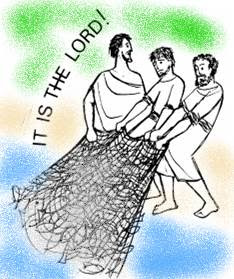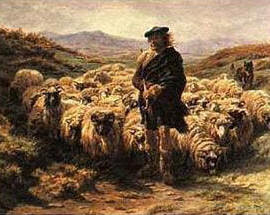
3rd Sunday of Easter
Jn 21:1-19
Suppose you know someone who has the power to give eternal life, the kind of life that knows no suffering, only everlasting joy, where everything is perfect, would you not follow him? Of course, you would, would you not? Who, in his right mind, would not follow him? But following is more than knowing or believing. Sometimes, it is precisely those who know or believe who do not follow. Or, at least, have a hard time in following.
Look at Simon Peter. Although Jesus chose him to be the leader of the Twelve Apostles, although Jesus built His Church on him, although he was the first pope, Simon Peter struggled through in following Jesus. He had many blunders along the way. Remember that Jesus called him “Satan” right after Jesus also gave him the name “Peter”, meaning “rock”, and said “on this rock, I will build my Church.” During the Last Supper, Simon Peter refused to have his feet washed by Jesus only to demand from Jesus later on that Jesus gives him a bath. In the Garden of Gethsemane, Simon Peter slept even as Jesus told him and the others to stay awake and pray. We are also very familiar with how he denied Jesus not once but thrice! This, he did even though he promised Jesus that he was ready to go to prison and die for Him. Perhaps, Simon Peter had more blunders than what we can read from the gospels, but they were not written at all because they were rather very embarrassing not only for Simon Peter himself but also for the Church whose first pope was he. But with the blunders we already mentioned, we have enough to imagine how difficult it was for Simon Peter to die to himself and follow Jesus all the way.
If we are honest enough, we can easily see our selves in Simon Peter. His struggles are also ours. Though different in forms, our blunders in following Jesus mirror his. We know Jesus and we believe in Him, do we not? But do we always follow Jesus all the way?
Since Jesus rose from the dead on that Easter dawn, many things already happened within just two weeks. Mary Magdalene, Simon Peter, and John saw the empty tomb. Jesus appeared to Mary Magdalene, then to the apostles locked up inside the Upper Room. With the two disciples who were on their way to Emmaus, Jesus also revealed Himself already risen from the dead. After a week, Jesus showed Himself to the apostles again, this time Thomas – who was absent when Jesus appeared to the apostles for the first time – was with them. This means that the disciples already knew that indeed Jesus has risen. They were already sure that it was not His ghost they were seeing but Jesus Himself. He breathed the Holy Spirit on them, and then gave them the power to forgive sins. “As the Father has sent Me, so I send you. Whose sins you forgive are forgiven them, and whose sins you retain are retained,” He told them. Because of these events following Easter, we expect that the apostles were already busy in doing what Jesus commissioned them to do. But what were they doing? They were fishing!
“I am going fishing,” Simon Peter said. “We will go with you,” said the others. Thus, Simon Peter, Thomas, Nathaniel, James, John, and two other apostles, went fishing. The succeeding events are very significant.
Simon Peter, James, and John – perhaps, also a number of the other disciples – were fishermen before Jesus called them to follow Him. Fishing was their trade. When Jesus called them, He called them from their father’s net to become fishers of men. Among them, it was Simon Peter whom Jesus appointed as leader of the apostles and of all the disciples of Jesus. Simon Peter knew this and all the followers of Jesus recognized Simon Peter as such. In short, we see Simon Peter going back to fishing and, with him, the rest of the disciples. As they say, “Ubi Petrus, ecclesia est” (“Where Peter is, the Church is”).
It is interesting though that while Simon Peter and the others went back to fishing, the fish seemed to be very unwelcoming of them. The fishers of men who tried become fishermen again caught nothing despite working all through the night. And when dawn came, Jesus came and caught them instead. I smile as I imagine that perhaps Jesus, upon seeing them, whispered something like this: “Look at these men! Hey, guys, what are you doing out here in the sea? Remember I said something like I am sending you as the Father has sent Me? Did I say anything about Me sending you to the fish? Have you forgotten about forgiving and binding? Hello?” But Jesus instead said to them, “My children, have you caught anything to eat?” Of course, they answered, “Nothing.” “Throw the net out to starboard and you’ll find something,” advised the Carpenter to the seasoned fishermen. When they did as they were told, the apostles had a tremendous catch – one hundred and fifty-three fish.
Does this not ring a bell? When Jesus called Simon Peter for the first time, Simon Peter was also fishing with James and John, and they caught nothing through out the night. If we put the Gospel today side-by-side with the story of the call of Simon Peter, it will be difficult for us not to notice several parallelisms. In the story of the call of Simon Peter, Jesus told them to go out into the depths again for a catch. Although hesitant at first, Simon Peter nonetheless went out into the depths again. And they caught so many fish that their boat, according to St. Luke, was on the brink of breaking. Seized by the miraculous catch of fish, Simon – who was not yet named Peter that time – fell at the knees of Jesus and said, “Leave me, Lord; I am a sinful man.” But Jesus told him, “Follow Me.” From then on, Jesus made Simon and his companion fishermen fishers of men. In the light of the events in the Gospel for this Third Sunday of Easter, we cannot help wondering: Did Jesus intentionally repeated the apostles’ call? Jesus called again the apostles who were unfaithful to Him and re-affirmed His choice of Simon Peter as their leader, despite Simon Peter’s blunders. Thereupon, John, the Beloved Apostle, said, “Dominus est” (“It is the Lord”)!
When they reach shore, the apostles saw that fish was already on the grill and bread was ready to be broken. Bread and fish – the miracle of multiplying bread and fish that fed thousands of hungry crowd stare at the faces of the apostles once again. We cannot say that they did not notice that. They remembered that Jesus provides for their needs. Jesus supplies for whatever is lacking in them. Then Jesus pressed on further the point He was trying to make by telling the apostles, “Bring here some of the fish you just caught.” But what for? Was it not that when they reach shore, fish was already on the grill? Why did Jesus have to ask them to bring Him some of the fish they caught?
While Jesus indeed provides for their needs and supplies for whatever is lacking in them, Jesus was teaching the apostles that they still needed to bring Him whatever they had. They had to cooperate with Jesus and unite with Him. And this is also how it is with us, present-day disciples of Jesus. Jesus will never forsake us, but we must cooperate with His grace. As we struggle each day in following Jesus, we have to bring to Jesus whatever we have and whoever we are. “Grace builds on nature” is a saying worth believing.
When Jesus appeared to the apostles on the evening of Easter Sunday, the apostles fed Him. When He appeared to them in the Gospel today, Jesus fed the apostles. On His first appearance, Jesus ate in front of His apostles to prove that He was not a ghost or a product of their collective hallucination. On His appearance to them in the Gospel today, He feeds them as a sign of His abiding care for them. He loved them not only until Calvary, but even beyond. He loved them more than they knew and expected. He loves us in the same way today.
After breakfast, Jesus took aside Simon Peter and had a heart-to-heart talk with him. Jesus re-affirmed His choice of Simon Peter as the chief shepherd of the Good Shepherd’s flock. This, Jesus did despite the many blunders committed by Simon Peter. The blunders of Simon Peter – no matter how many and how grave – were not enough for Jesus to change His mind about choosing Simon Peter as the first pope.
Simon Peter was not always successful in his struggles along the path of discipleship, but he remained with Jesus nonetheless. He did not surrender to hopelessness over his blunders – great and small. He was not successful, but faithful. Bl. Teresa of Calcutta once said, “God does not expect us to be successful, but to be faithful”. In the person of Simon Peter, Jesus agreed with Bl. Teresa even before she said those inspiring words.
Simon Peter is like all of us. He committed blunders in life. We should imitate Simon Peter. Do not stay away from Jesus despite our blunders in following Him. All men and women fall, but not all rise again. Those who rise again are the ones who become saints, whether officially canonized or not. Our life of following Jesus is a life of rising again and again. It is also our mission to help those who, after falling, want to rise again. As we help one another rise again after every fall, we behold Jesus in each of us and we say, as the Beloved Disciple said, “Dominus est!”
 4th Sunday of Easter
4th Sunday of Easter



